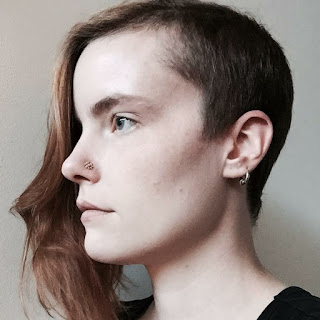T.A. Noonan is the author of several books and
chapbooks, most recently The Midway Iterations (Hyacinth Girl Press,
2015), Fall (Lucky Bastard Press, 2016), and The Ep[is]odes: a
reformulation of Horace (Noctuary Press, 2016). Her work has appeared in LIT,
Menacing Hedge, Ninth Letter, Phoebe, Reunion: The
Dallas Review, West Wind Review, and others. A weightlifter, artist,
teacher, and priestess, she is an Associate Editor of Sundress Publications and
the Development Director for the Sundress Academy
for the Arts.
for the Arts.
DS:
Why do you write poetry?
TN: Poems are spells. I write what I want to
manifest, banish, bless, curse, invoke, evoke, honor.
DS:
What do you hope to find in poems written by other people?
TN:
Magick I haven’t seen before. Or maybe magick I have seen before, but executed
in a different way. Ultimately, I want wonder. I want to be swept up in the
spell.
DS:
Describe your works in progress.
TN:
All of them? Well…
I’m
kidding. Kind of.
Right
now, I’m bouncing between three major projects. The first and oldest is Extraordinary Claims, a poetry
collection exploring the intersections between astrophysics, fashion, and
Florida. You’d be surprised at how much they connect to one another. I’ve
probably been working on EC for about
six years, and every time I think I’m done, I realize I still have a lot more
to do. So, the fact that I just said something about it publicly probably means
I have to start over.
Then
there’s Kraftwerk and Other Euphemisms,
a kind of cross-genre monster exploring witchcraft and occultism. Being all weird
and shit means it doesn’t lend itself to my usual process.
The
last one is Watermamas: A Fable, a
novel about gods, manatees, and memory. I’m still in the early-draft stage but
really excited about what I’ve got thus far.
I’ve
also been picking here and there at a series of poems about Sailor Moon, but I don’t know if that’s
a “work in progress” so much as an “occasional obsession with an unsure
future.”
DS:
What are your hopes for the future of poetry?
TN: A lot less fear, a lot more inclusivity. I want a poetry
world that isn’t afraid to let marginalized writers step out of those margins;
the poetry world’s plenty big enough for all of us. No one should feel
“threatened” by diversity. I think the only real “threat” is that those diverse
voices may be too fiercely beautiful, that the heat from their awesome words
might be too much for us to handle, that we may have to work twice as hard to
be half as hot. Of course, this means we need people willing to do that work—editors
and publishers determined to make their venues safe for poets from every race,
class, religion, sexual orientation, gender identity, educational background, career
path, etc. Those who are marginalized, though, can’t do that work by
themselves. It’s up to those coming from places of privilege to use that
privilege responsibly.
I’d also like more handmade books, please. I’m a sucker for
them.
T.A.'s Books:
Some of T.A.'s Poems Online:







